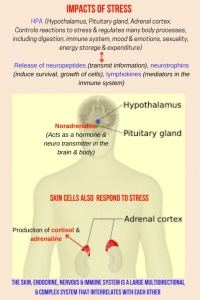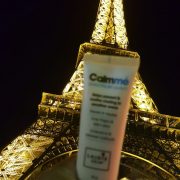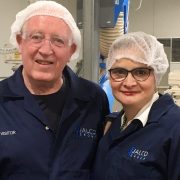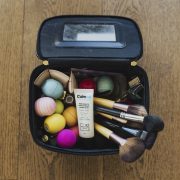How to have happy and healthy skin for longer
For happy and healthy skin for longer, you don’t really need super expensive ‘miracle’ potions, lotions and ‘top secret’ procedures. All you need is discipline, and a balanced approach to self-care.
As a chemist who has worked in the industry for 30 years internationally, you can just imagine how often I am asked the questions, “what are you using and what do you recommend?”
In this blog I am going to share what I know to be true. I am not going to plug one specific product and if I have nothing good to say, I choose to say nothing at all.
What I would like to do is to encourage a holistic approach to skin care.
Holistic = Mind + Body + Soul
Move that body
Ageing is a natural process and so much better than the alternative! Having said that, there are certain things that we can do to either accelerate or slow down this natural process as we age.
For starters, begin from the inside and SWEAT it out!
We all know that exercise is good for our heart, but did you know that it is also good for the largest organ in the body, our skin? Skin plays a vital role in protecting all of our internal organs.
Every 35 days our skin replaces itself. Our skin is constantly changing and regenerating itself, whist remaining waterproof.
As we age regular exercise is key to having healthy skin. Any type of exercise will do, dancing, walking, running just get that heart pumping. Exercise coupled with mindful breathing, is not only good for your mind and body, it’s great your skin.
Sweaty bodies are healthy bodies.
Every time you SWEAT it out, your skin says,
“Thank you!”
Promotes circulation
Any physical activity done consistently promotes healthy circulation. Exercising is like cleansing your skin from the inside.
As the blood circulation increases, more blood cells reach the skin cells delivering oxygen and nutrients. More nutrients help create new skin cells and repair those cells that have been damaged due to toxins. In a nutshell, less toxins equals brighter healthier skin.
Exercise also promotes the production of fibroblasts, which are the skin cells responsible for collagen. Collagen plumps and rejuvenates the skin. (BTW collagen is a big molecule that can’t enter the skin via a cream!)
Exercise is an effective skin anti-ager.
For those with skin issues such as acne, rosacea, eczema or psoriasis, please don’t let this stop you from getting out and being active. When exercising just be careful as to how you dry the sweat from your skin. The best way to dry our skin, is to pat dry, gently.
Before Exercising
It is best to clean your face and be free of any make-up before exercising, as this can lead to breakouts and irritate sensitive or problem skin.
That ‘after workout glow’
Some may call is red face or sweaty face, I call it the ‘after workout glow!
Make sure after you sweat it out that you have a shower immediately with warm running water. If you are prone to skin issues cleansing after exercise and patting down dry gently is imperative.
Happy skin is less stressed
Emotional stress can affect, reveal or even exacerbate a number of skin related issues. There is increasing scientific evidence that proves that stress influences the disease processes and contributes to the inflammation through regulating hypothalamic-pituitary-adrenal axis (HPA Axis).* The HPA is basically the system that controls our body’s reaction to stress, which then influences many other body processes.
How? Check this out:
When we are stressed our body produces more of the hormones cortisol, adrenalin and norepinephrine.
Too much cortisol can suppress the immune system, increase blood pressure and sugar, decrease your libido, contribute to weight gain, stimulate the production of acne, trigger eczema and the list goes on.
Noradrenaline helps shift blood flow away from areas where it might not be so critical, like the skin. As a result blood is directed towards what is considered to be more important when the body is under stress, the muscles. Consequently, the skin gets robbed of its nutrients.
A complex interrelated system
The skin, endocrine, nervous & immune system is not autonomous of each other. This is a large multidirectional & complex system that interrelates with each other. Hence why we recommend a holistic and balanced approach to skincare.
The stress that begins from the inside, your brain,
will eventually show up on the outside, your skin.
If you already have an existing skin condition or are prone to one, a stressful event will make your skin issues flare up.
Healthy skin heals faster
Our skin starts to age in our mid twenties. As we age, its ability to heal slows down.
A study in older adults found that regular exercise may speed up the wound-healing process by as much as 25 percent. The faster a wound heals the lesser the chance of getting an infection.
Further, at least 30 minutes of exercise per day will help reduce your stress levels too.
Sun protection is key
Protecting your skin from the damaging and ageing affects of the sun is imperative for healthy skin for longer.
Sun protection is an effective skin anti-ager
No matter the colour or shade of your skin, sun protection is key to preventing skin cancer.
Exercising Outdoors
If you are exercising outdoors, ensure that your skin if well protected from the sun. Wear protective clothing, a hat and apply sunscreen with a high SPF over 50+. When applying sunscreen make sure that you have applied it on the back of your hands, tips of your ears and the back of your neck. These are the areas that are normally neglected and they are the same areas that show the first signs of premature ageing.
Try and keep out of the sun between the hours of 10am and 4pm, as this is when the sun is at its strongest and can cause the most damage, from premature ageing to skin cancer.
EAT REAL food
A balanced approach to eating food is sustainable. The food and drink that we consume is used by our body to nurture and create new skin cells every month, so choose wisely.
We do not recommend ‘fad diets’, ‘restrictions’, ‘meal replacements’ or anything other than old fashioned REAL FOOD, which is cooked using fresh ingredients.
Make healthy eating a habit, not a fad diet!
Preparing your own meal may appear to be time consuming versus the convenience of buying ready-made food. But our organs are worthy of some extra love and attention.
Eating a balanced diet and one that is rich in antioxidants (fruits, dark green vegetables, legumes and fish) is important for maintaining healthy skin.
A diet rich in essential fatty acids (omega 3), like salmon, tuna, mackerel, almonds and seeds, is not only good for combating fine lines, wrinkles, but other skin problems such as acne, eczema and psoriasis.
A mediterranean diet and a low glycemic index (low GI ) diet have been demonstrated to help reduce inflammation and therefore, flare ups. Low sugar foods are best for happier skin.
Drink the gift of life
Healthy skin is well hydrated skin. It is recommended that we drink at least 8 glasses of water a day and no coffee or champagne doesn’t count as fluids!
Keep hydrated especially whilst exercising and ensure that you replenish those lost fluids with lots of water afterwards.
Eliminate toxins
Smoking is an effective skin ager and so is drinking alcohol to excess. Toxins help accelerate the ageing process.
Setting boundaries and eliminating all toxins, including the human kind, is highly recommended for happy and healthy skin.
Keep it simple
What ever you do, keep your skincare routine simple, doable and stress free.
The essentials are:
- Moisturise every bit of your face and body, daily.
- Don’t over wash
- Always be gentle when drying your skin.
- If your skin is free from dermatological issues, then scrubs and masks are good.
- Those with acne or eczema steer away from scrubs, exfoliants or wet wipes.
- Sunscreen always.
- Don’t pick and keep hands away from your face.
- Always remove makeup before you nod off to sleep.
- SLEEP
At different stages in life, we will all have some type of concern with respect to our skin. Whether it be acne, eczema, dermatitis, chafing, wrinkles, too oily, too dry or itchy.
Let me reassure you, every single human being on this planet has some challenge that they need to overcome. Our attitude and our response towards these challenges is what makes all the difference.
For happy and healthy skin, begin with the end in mind and SWEAT IT OUT!
Enjoy the skin you’re in.
First appeared on the blog, The Nose Knows by
Bachelor Applied Science (Chemistry)., Master of Business (Marketing)., Post Graduate Certificate in Sustainability.
Founder of LAJOIE SKIN and the anti-chafe cream, Calmmé.
Catch up with us on Facebook, Instagram, Twitter.
References:
Department of Dermatology, Venereology and Allergology, Wroclaw Medical University, Wroclaw, Poland. areich@derm.am.wroc.pl, 2010
Wagner, Holly: Study, “Exercise helps heal wound healing in older adults”. Jan 3 2005. http://www.worldhealth.net/news/exercise_helps_speed_wound_healing_in_ol/
BBC. “Organs – Skin.” (May 28, 2010) http://www.bbc.co.uk/science/humanbody/body/factfiles/skin/skin.shtml
National Geographic. “Skin.” (May 27, 2010) http://science.nationalgeographic.com/science/health-and-human-body/human-body/skin-article.html
Dermatology, American Academy of. 2007. Feeling Stressed? How Your Skin, Hair And Nails Can Show It. [Online] 12 November 2007. [Cited: 30th August 2016.] https://www.sciencedaily.com/releases/2007/11/071109194053.htm.
*Definition.
The hypothalamic–pituitary–adrenal axis (HPA axis) is an interactive neuroendocrine unit comprising of the hypothalamus, the pituitary gland, and the adrenal glands.
The HPA axis plays key roles in basal homeostasis and in the body’s response to stress.
These organs and their interactions constitute the HPA axis, a major neuroendocrine system that controls reactions to stress and regulates many body processes, including digestion, the immune system, mood and emotions, sexuality, and energy storage and expenditure.














